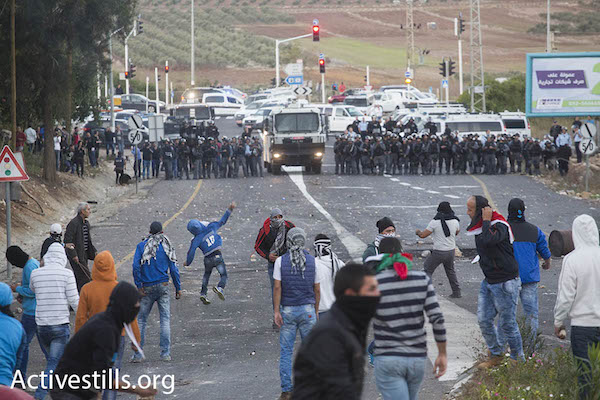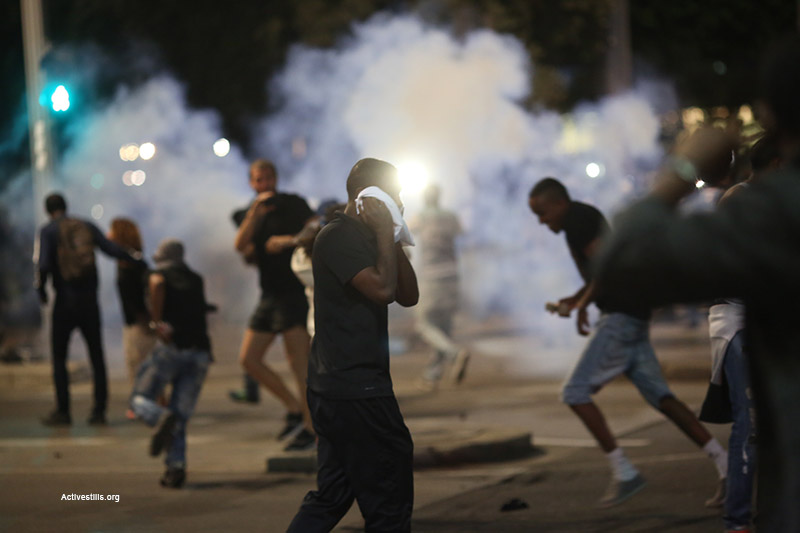Netanyahu and the Israel Police offer diametrically different responses to two cases of police violence, one against an Ethiopian Israeli and another against an Arab citizen of Israel. When it comes to police brutality, it seems that even racism stinks of discrimination.
Two separate cases of police violence against Israeli citizens were caught and recorded by CCTV cameras over the past six months.
The first incident involved a Palestinian citizen of Israel, Kheir Hamdan. Last November, Hamdan approached a police van in Kafr Kanna and started banged on its window with an object. When he fled, officers exited their vehicle and shot him in the back, then dragging his body into the van like a sack of flour.
The second incident involved an off-duty Israeli soldier of Ethiopian descent, Damas Pakedeh. Last week, two police officers stopped Pakedeh while he was walking his bicycle down the street and assaulted him for no apparent reason. When video of the assualt came out, the two officers were summarily fired.
On Tuesday, the Israeli police internal affairs division (PID) announced it was closing its investigation into Hamdan’s death. No charges will be brought against the officers who killed him.

Following Hamdan’s killing, mass protests broke out in Kafr Kanna. Hours later, Netanyahu said the protesters would “be punished with utmost severity.” The prime minister even said his government would “evaluate revoking the citizenship” of some protesters.
When the video of Pakedeh’s beating was published, Ethiopian-Israelis also took to the streets and police also violently suppressed their demonstrations. That’s where the two stories diverge.
While the Ethiopian protests were still raging Sunday evening, Netanyahu sent out a different type of message, a calming message: “All claims will be looked into but there is no place for violence and such disturbances.”
A day later Netanyahu convened meetings with Damas Pakedeh, five ministers, the heads of nearly every Israeli law enforcement agency and a number of representatives of the Ethiopian community. Among the published conclusions of that meeting was: “The Israel Police will evaluate the claims of Israelis of Ethiopian descent regarding discrimination and will act to eradicate such phenomena.” Netanyahu personally added: “We must all line up against racism, condemn it and work to eradicate it.”
Notice a change in tone? This is the same prime minister who described Arab suffrage in Israel as a threat to the regime on the eve of elections.

Freshman Joint List MK and senior legal scholar Yousef Jabareen called the decision to close the case against the officers who killed Hamdan outrageous and scandalous.
“Kheir Hamdan is the victim of institutional and institutionalized racism, and we will not play along,” MK Jabareen continued. “As a lawyer and as somebody who heard testimonies from the family, I think that PID has become a tool for concealing the crimes of these racists, not only against Arab citizens, 40 of whom have been killed by police since the year 2000, but also against Ethiopians, Mizrahim and social activists, who have all experienced police violence.”
Police killed two other unarmed Arab citizens of Israel earlier this year in the southern city of Rahat. In that case, an unarmed man, Sami Ja’ar, was shot dead by police, his father Khaled was arrested and badly beaten in custody, and then another man was killed at Sami’s funeral.
The officer responsible for killing Sami Ja’ar was arrested for the purpose of the investigation but was released after just one day. To ensure he would still have a job and to send a message of support down the ranks, the Southern District police commander had the officer assigned to his own office.
The High Court of Justice recently accepted a petition by the Ja’ar family asking for an order nisi, which compels the State to explain why the officer who killed Sami is no longer in custody and hasn’t been charged, why he was allowed to return to work as a police officer, and why the officers accused of beating Khaled have not been arrested. A hearing is set for July 27, 2015.



